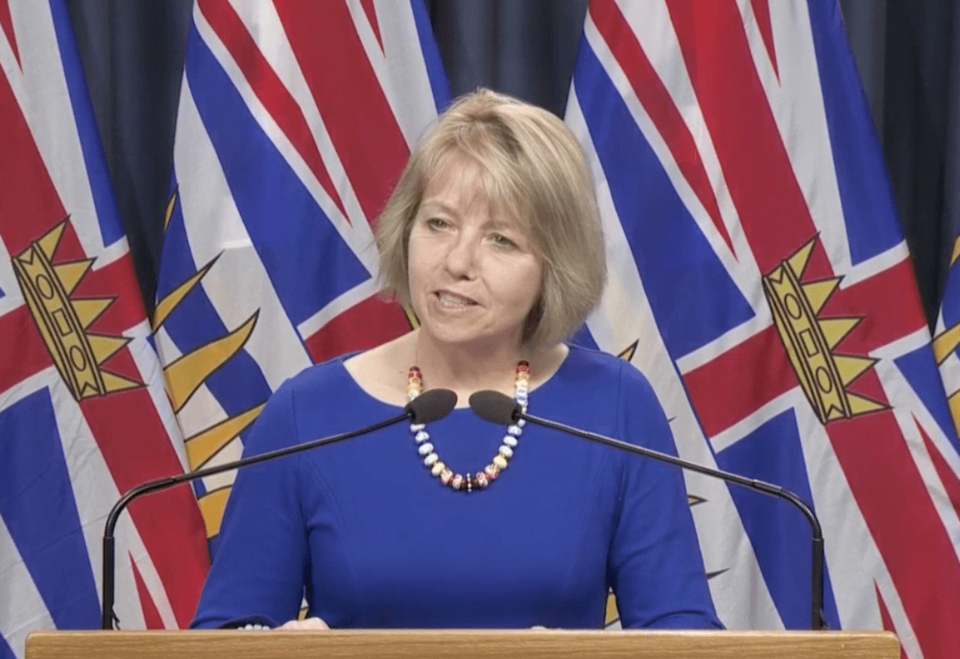There are now 7,498 cases of the coronavirus (COVID-19) in B.C. after health officials announced 122 new cases Wednesday.
Provincial health officer, Dr. Bonnie Henry reports that there are 2,660 cases in Vancouver Coastal Health (VCH), 3,835 in Fraser Health, 195 on Vancouver Island, 485 in Interior Health and 237 in Northern Health.
Additionally, there have been 85 cases of COVID-19 in B.C. of people who reside outside of Canada.
There have been no new health-care facility outbreaks. In total, 11 long-term care or assisted-living facilities and three acute-care facilities have active outbreaks.
There have been no new community outbreaks. However, there continue to be community exposure events at other locations and on flights into and out of the province.
There have been no new COVID-19 related deaths, for a total of 219 deaths in British Columbia.
Of the total COVID-19 cases, 60 individuals are hospitalized, 23 of whom are in intensive care. The remaining people with COVID-19 are recovering at home in self-isolation. As well, 2,966 people are under active public health monitoring as a result of identified exposure to known cases.
There are 1,614 active cases of COVID-19 in the province and 5,646 people who tested positive for COVID-19 have recovered.
Alerts are posted on the BC Centre for Disease Control’s (BCCDC) website, as well as on health authorities’ websites, providing details on where the potential exposure occurred and what actions to take – whether you need to self-isolate or monitor for symptoms.
“Beginning today, the BCCDC website will also link to regional health authorities' school notification pages, providing the date and type of notification (outbreak, cluster or exposure) for impacted schools. Fraser Health’s school notification page is available now and the other regional health authorities will have theirs ready soon," said Henry.
“As we learn more and better understand where the risks exist, we will continue to adjust our COVID-19 approach and response in B.C. to protect those who are most vulnerable. This is our priority for not only COVID-19, but the second equally concerning pandemic of overdose deaths.
“Today, a new provincial health officer order has been put in place to increase the number of health professionals authorized to provide safer alternatives to the toxic drug supply.
“This new order is about connecting more people to treatment and doing all we can to save lives by supporting people who use drugs to do so safely.
“As we work to support each other, one of the biggest concerns with COVID-19 is the unidentified spread of the virus in our communities. This is why getting tested as soon as you have symptoms is so important.
“With the knowledge of new cases or clusters, public health teams can quickly complete contact tracing, notify those who may be exposed and more importantly, contain the further spread.
“It doesn’t help to shame and blame those in our communities who have the virus, because it quite often discourages others from coming forward and getting tested, putting all of us at risk.
“Rather, we need to show compassion and care, not judgment, when there is a new case in our community.
“Large gatherings have been a steady source of transmission. However, many of the new cases we are seeing in the past weeks are from small gatherings where people see different groups of friends on different days – inadvertently spreading the virus to many people.
“Let’s not forget that if we are close enough, doing enough and with enough different people, the likelihood of transmitting the virus significantly goes up. That is why it is so important to make our social interactions a ‘small and safe six,’ keeping to our immediate households and the same close friends only.
“September is our month to get ready for the respiratory season, to hold steady with our layers of protection and go forward with the routines that will keep our communities and our loved ones safe.”



